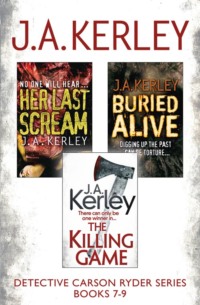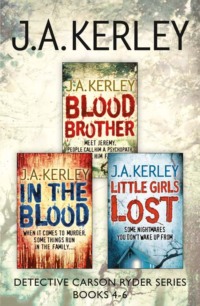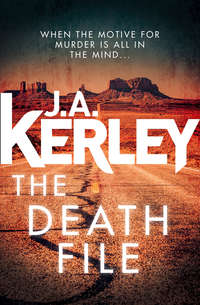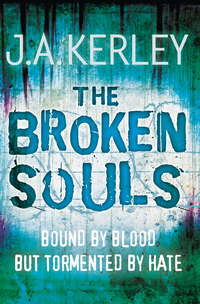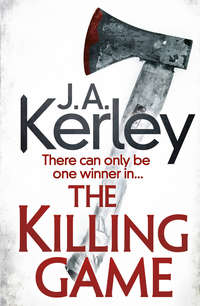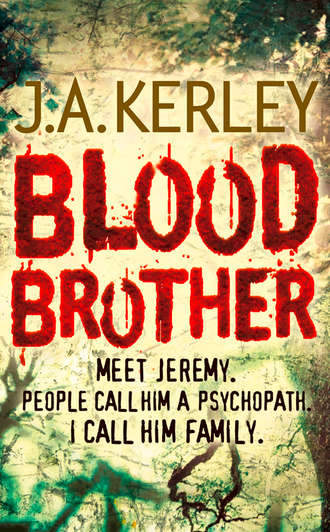
Полная версия
Blood Brother
I repeatedly punctured a piece of romaine. I didn’t want to lie, but couldn’t tell the truth. Not fully.
“I was a Psych major in college, Shelly. I did prison interviews with psychos and socios. Dr Prowse thought I had a rapport with them, made them drop their guard. That’s probably the gift she was talking about.”
I sensed Waltz didn’t believe I was telling the full story. But he shifted the conversation. “I’m not ready to close this box yet. I’ve convinced those in command to give you a few days here in case we need your input.”
I raised an eyebrow at Waltz’s ability to sidestep immediate authority. “Sounds like you went above Lieutenant Folger.”
“A step or two. That’s not a comment on her, either personally or professionally. She seems unhappy with some aspect of her life, and it makes her brittle, but the Lieutenant is blessed with a highly analytical mind. She’s destined ever upward, as the sages say.”
“She seems young for all the authority.”
“She’s thirty-two, but has been climbing the ladder three steps at a time. After a degree in criminal justice – top of her class, highest honors – she started in uniform in Brooklyn, grabbed attention by using her head, analyzing crime patterns, offering realistic solutions. She worked undercover for a while, setting up sting operations, pitting dope dealers against one another, busting a fencing operation that reached from Florida to Canada …”
“Not your ordinary street cop.” I felt a sudden kinship with Alice Folger. My departmental rise began by solving a major crime while still in uniform.
Waltz nodded. “She seemed almost driven to prove herself as a cop. It got her noticed by a few people with clout. They touted Ms Folger to the big brass at One Police Plaza – HQ. Her supporters suggested the brass jump her in rank and send her here to be tested. We’re a big precinct and our homicide teams handle everything from street craze-os to murderous stockbrokers. It’s a plum placement for a detective displaying more tricks than usual.”
Perhaps like you, Shelly, I thought.
“I’m a fellow officer. Why does Folger think I’m useless?”
“Johnny Folger, her late father, was NYPD. All three of Johnny’s brothers were on the force, one died on 9/11. An aunt works in the impound. That’s just this generation. Before that …”
I held up my hand. “I get your point, Shelly. Folger has cop in her DNA.”
“Or overcompensating to create the genes.”
“What?”
He waved it away. “Nothing. I always found families more custom and tradition than blood, but that’s my take. What it boils down to is that Folger’s a partisan. She sees you as a –, as um …” Waltz fumbled for the word.
“As a rube,” I finished. “Someone to stumble over while the pros handle the heavy lifting.”
Waltz sighed an affirmation. I slid my unfinished salad over to join his sandwich and leaned forward, arms crossed on the table.
“How did I get here, Shelly? You know what I mean. How does a detective push the pause button on a homicide investigation, and get the NYPD to pull me from Mobile to New York in a heartbeat?”
Waltz looked uncomfortable. His fingers traced the rim of his glass. “Five years ago a councilman’s daughter ran off with a cult leader, a psychopath. I tracked him down in Alaska and personally brought her back. She had a successful deprogramming and the whole nasty incident stayed under wraps.”
I pursed my lips, blew silently. “There’s a grateful councilman on your shoulder? No wonder you could call the Chief direct.”
He shrugged. “That and a few other successes have given me a reputation for dealing with cases like your PSIT handles, the psychological stuff. I’m allowed latitude others don’t have. An input role.”
A thought about Shelly’s clout hit me. “Were you one of the supporters responsible for Alice Folger’s jump to the major leagues?”
He waved it away like it was no big deal. “I saw talent, I passed her name upstairs.”
I figured Waltz had seen a bright spark in Alice Folger and decided to drop it into an oxygen-laden environment to see if it would blaze or burn out. Judging by the veiled admiration in his voice, Folger had blazed bright.
I said, “Where do I go from here?”
“I’ve arranged you a hotel room nearby. Check in, get whatever you need and you’ll be reimbursed. You can come in to the department, or I’ll send reports to your hotel. I simply want you to see if you can add anything.”
“That’s all?”
“It’s what the lady wanted, it’s what the lady gets.”
Lady wanted, I thought, not victim wanted. Good for Waltz.
Waltz offered to drive me to the hotel, but needing to clear my head I started walking. I ducked into the continuing mist, my mind swirling into the events that had slammed my life into Dr Evangeline Prowse, with repercussions that would forever echo in my soul. Events I had not, could not, tell Sheldon Waltz.
The Alabama Institute of Aberrational Behavior housed an average of fifty criminally insane men and women. It had become one of the more enlightened such institutions under the stewardship of Dr Prowse, who had made a career-long study of psychopathy and sociopathy. It was claimed no doctoral candidate in abnormal psychology could write more than five pages without citing Vangie.
In one of her cases, a sixteen-year-old boy had murdered an abusive father, disemboweling him with a knife, a slow and hideous death by vivisection. The homicide was so savage that the local police did not suspect the boy, an intelligent and gentle soul, barely questioning him.
Starting two years later, five women were murdered in a grim, violent and symbolic manner. After the third mutilated victim appeared, the FBI gave the case material to Vangie. She studied the bizarre and ceremonial crime scenes, detecting signs of a tormented child. The police finally turned their eyes toward a twenty-six-year-old man whose father had died in the woods years before. He confessed, was ultimately pronounced insane, and Dr Prowse petitioned for him to be brought to the Alabama Institute of Aberrational Behavior.
I was in college at the time of the killer’s capture. Dr Prowse and I had met through that case, and had been bound by it for years.
The father was my father. The killer was my brother, Jeremy.
“Get back here, Jeremy, you little coward …stop that squealing …I’ll give you something to squeal about …”
“Don’t, Daddy, please don’t, Daddy …”
Though my father, Earl Eugene Ridgecliff, functioned as a respected civil engineer, he was diseased with anger. As children, my brother and I lived with the fear that anything – a word, a glance, a misperceived gesture – could explode into horror. My brother, older than me by six years, became the focus of our father’s physical rage, and I still awoke in cold sweats with my brother’s screams razoring through my home.
“Help me, Mama, help me, Mama … Daddy’s trying to kill me …”
I had never used the word murder for my brother’s actions against our father, preferring “attempted salvation”. Had Jeremy been caught and tried he might be free today, a jury figuring anyone suffering such agony had little recourse but to kill his tormentor.
But years of abuse had planted a seed of madness inside my gentle brother. Even as we built our neighboring forts in the oaks, signaling to one another with torn sheets like ship’s flags, fished for catfish in the slow Southern creeks, or lay in the summer grass and stared at clouds, the seed grew into vines that wrapped and strangled his soul.
My mother was a beautiful and emotionally fragile woman twenty years of age when my father, eighteen years her senior, passed through her small country town on an engineering project. Married within two months, my mother expected a storybook life. Instead, she found herself embroiled in a hellish drama so far beyond comprehension her only recourse was retreating to her room to practice her sole skill: the sewing of wedding dresses, white and flowing waves of satin and tulle.
The mutant seed within my brother caused him to believe our mother could have intervened in the nights of terror at the hands of our father. She could have more easily stopped the tides with her fingertips.
“The Alabama State Police today announced a suspect in the bizarre and brutal killings of at least five women …”
So deep was my brother’s belief in our mother’s complicity in his suffering that a few years after killing our father, Jeremy began killing our mother. I speak metaphorically: To actually kill her would have consigned me to a foster home – and he would not have done that – so surrogates fed his unfathomable need. Shamed by my brother’s actions, I changed my name, hid my private history behind veils of obfuscation, and refused to visit him.
It was Vangie – with input from Jeremy – who tracked me down and convinced me to reestablish a relationship with my brother. Jeremy and I had even collaborated – if that’s the word – on several cases where his unique insights helped me understand the crimes. He was so finely calibrated for madness he once boasted he could walk through a mall and point out a half-dozen people “either convinced Martians are reading their minds, or thinking things so dark they’d make Torquemada retch”.
My brother was not only insane himself, he was a Geiger counter for insanity in others.
THREE
The desk staff at the mid-town hotel were expecting my arrival and treated me with deference though I was in sodden clothes and my shoes squeaked footprints across the marble floor. They directed me to a nearby shop where I secured denim jeans, three cotton dress shirts, a white linen sport coat, a pair of upscale walking shoes plus underwear and socks.
Finally in my hotel room, a third-floor double dressed in somber monochrome – black, gray, gray-white – I showered, then snapped on a muted CNN to add color and distraction to my world. I unwrapped my new dress shirts and rinsed them in the sink to remove the creases and factory starch, squeezing them as dry as possible. In the cool and arid air conditioning they’d be set to iron in the morning. I did the same to the tees.
The phone rang, the desk advising me a package had just been delivered. A small Hispanic gentleman brought an envelope to my room, NYPD stamped on top left corner, the information Waltz had promised. As he had noted, it was spare, the investigation barely off the launching pad.
The prelims from the forensic teams in Vangie’s room featured all the No’s: No signs of struggle, No blood or body fluids visible, No seeming thefts, No signs of a search. I noted the mention of a closet with casual-type wear that seemed good for a week’s stay. It appeared she had packed for a normal visit to NYC.
Yet before this particular visit, Vangie Prowse turned on a video camera, noted my experience with serial killers, then proclaimed she’d made a strange decision, and was “doing things that make little sense. But I needed a serious –”
She’d had to hang up before finishing the sentence. Needed a serious what? Doing what things that made little sense? As if that wasn’t cryptic enough, she’d looked into the camera and apologized.
“Carson, I’m so sorry.”
What the hell had Vangie done?
I lay on the bed and studied the ceiling and ran that question in front of my eyes a hundred times until I drifted into a sweaty, twitchy sleep.
A ringing phone at the bedside awakened me. I dropped it, picked it up by the cord and bobbled it to my ear.
“Hmmp?”
Waltz. “We’ve got a dead woman, Detective Ryder. It’s a bad one.”
“Do I know her?” I mumbled from between two worlds.
“Jesus, wake up, Detective. You don’t know her. God, I hope not. I’m on scene and sending you a car. Be out front.”
“Waltz, um, wait. Let me get myself toget—”
The phone clicked dead. The clock said it was 8.10 p.m. I’d slept for two hours. My washed shirts were soggy. All I had was the one I’d worn through the day, reeking of sweat and despair. Holding my breath, I pulled it on and headed outside.
Day was failing fast, oblique light soaking the sky with an amber hue. City noise echoed down the man-made canyons, giving the sounds a reverberant depth. A police cruiser waited on the sidewalk, almost to the hotel steps. I was barely inside before the cruiser roared into traffic. I looked at the driver: Koslowski. He wrinkled his nose at my used clothes, shot me a glance, and rolled his window down.
“Where’s the scene?” I yelled over the siren. The traffic was mainly taxis. Koslowski kept his foot deep in the pedal, expecting cabs to open a path by the time he got there, and somehow they did.
“SoHo. If I don’t get you there in five minutes, Waltz is going to chew my ass.”
“I can’t imagine Waltz chewing ass.”
“He does it without words. It’s worse that way.”
“He’s an interesting guy,” I said, fishing for more info about the sad-eyed detective. “What’s your take on him?”
Instead of answering, Koslowski pulled to a brick Italianate duplex, a FOR SALE sign in the tiny front yard. I saw one cruiser by the curb, and a battered SUV with NYPD TECHNICAL DIVISION stenciled on the door. Beside it was a van from the Medical Examiner’s office. A blue-and-white was sideways across two lanes to keep gawkers distant, its light bar painting the street in shaking, multihued bursts. I jumped out and hustled toward the house.
“Hey, Dixie,” Koslowski called.
I spun. “What?”
“You asked me what I thought about Shelly Waltz.” He jammed the cruiser in gear. “When it’s nighttime for the whole world, and everyone is asleep, Shelly Waltz flies through the sky on a silver unicorn.”
“What?”
But Koslowski’s taillights were already flowing away. Shaking my head, I entered the house. A man and woman from the Medical Examiner’s office stood inside the door, opening a case of equipment. They looked shaken, ashen. They directed me down a hall to a bedroom. I smelled blood and my stomach shifted sideways.
I entered the room. Like the front rooms, it was devoid of furniture. Shelly was alone, standing above a draped figure in the center of the floor. The white cover was turning red as I watched. Waltz was rubbing his eyes with his palms.
“What is it, Shelly?”
He shook his head, lifted the cover. A woman’s nude body. Her eyes stared wide from the center of her own belly. Blood and fascia and yellow fatty tissue surrounded the head, having squirted out when the head was jammed into the wound. I let it all register for a five count, then closed my eyes.
“We’ve got a bad problem,” Waltz said.
“Bad as it gets,” I affirmed.
Waltz let the cover fall back over the corpse. When it fell it puffed out air, swirling hairs on the floor, the same amalgam I’d seen at Vangie’s crime scene: hairs of various colors and textures. Looking closer, I saw them scattered everywhere. On the tile floor, laying atop congealing pools of blood, on the window sill.
We turned to a thunder of footsteps approaching down the hall followed by Folger’s bray.
“Waltz? Are you back there?”
The footsteps turned into three agitated faces, Lieutenant Folger and Tweedledum and -dee from this morning – the hulking Bullard and Abel Cluff, a smaller and older guy with bulging eyes and the forward-pointing facial structure of a stoat. Cluff was wheezing, like he’d run a dozen flights instead of walking up a five-step stoop out front. Both men were in dark suits and white shirts, Bullard’s plank-thick wrists hanging two inches from his sleeves, like he’d grown since he’d bought the suit.
The trio moved past, stepping around the blood pools and smears. Cluff bent and lifted the cover from the corpse. His eyes showed neither surprise nor emotion and I figured being an older detective with the NYPD, he’d seen every possible permutation of horror.
“Oh Christ,” Folger moaned when she saw the body. “Tell me I’m dreaming, we don’t have a mad butcher out there.”
“Removing the head could be an attempt at depersonalization,” I ventured, trying to be helpful. “But inserting it in the abdomen could be a show of control: Behold my power. Or it might –”
Folger snapped her face to me. “What the hell are you doing here?” She sniffed, wafting her hand past her nose at my scent. “Jesus, they don’t have soap or deodorant where you’re from?”
Waltz said, “I invited Detective Ryder, Lieutenant. Given his experience with disturbed minds, I thought he might –”
“He’s not needed,” she said. “Stick him on a bus and aim it south.”
Bullard pinched his nose and gurgled a laugh. “You may want to spray him with something first.”
“Have you seen all you need, Detective?” Waltz asked. He shot me a look that said he knew I hadn’t, but it was time to let the Lieutenant win one. I nodded yes for the sake of harmony, and we retreated outside. There were now three cruisers on scene, one ambulance, an ME vehicle, a forensic vehicle, a large command vehicle and Waltz’s dinged-up blue Chevy Impala. The area was cordoned with yellow CRIME SCENE tape. The kid from Tech Services, Cargyle, jogged by, phone to his face and a heavy case slung over his shoulder.
I said, “Looks like you people are about to ramp into full investigative mode, Shelly. I’ll catch a cab.”
“One question, Detective. The eyes of the two victims. What do you make of the eyes?”
“That they’re open?” I said. “Not closed or covered or mutilated?”
“Yes.”
“He feels no shame at his actions, Shelly. There’s a good chance he feels pride his victims get to watch him at work.”
Waltz nodded sadly and turned as white as a man struck by lightning. Photoflash. I spun and saw a photographer a dozen feet distant.
Flash.
“Hey, Detective Waltz, s’up in there? Who’s dead?”
Flash Flash.
I saw blue squares floating in the air. Waltz gestured for a uniform to move the guy away. The photog retreated on wide and flat feet, grinning like a donkey, holding his hands up in the I surrender pose. He was a short guy, round, round, and round – face, belly, and butt, respectively.
I looked at Waltz. “One of the local media elite?”
“That piece of waddling excrement is the infamous Benny Mac. The prize scribbler-slash-camera jockey from the New York Watcher. It’s the newspaper for citizens who don’t like to read. We’ll be in it tomorrow, unless something important takes the space, like a celebrity getting a DUI or a cat that uses a toilet.”
I watched the guy pad across the street, shooting an arm into the air like an imperious wave. An engine roared to life down the block and a double-parked white Hummer sailed to Benny Mac’s side. He climbed inside, barked some command to the driver, and was whisked away, smirking through the window as he went.
FOUR
“Meester Ryder? Room service. I brought breakfas’.”
The Spanish-accented voice and knocking seemed too close. I felt something hard against my nose, something gritty pressing my cheek.
“Meester Ryder?”
My eyes popped open. I was on the floor by the door, nose against the wood, cheek on the carpet. I’d been dreaming.
“Just a minute,” I mumbled, staggering upright. “Be right there.”
I saw covers, sheet and pillows trailing from the bed to the door. Having dreams so disturbing I’d try to crawl away from them happened several times a year. The imagery was consistent: moaning shadows, faces comprised solely of teeth, a house where all windows faced inward …dreams generated during childhood.
I scooped the bedclothes up, threw the pillows and covers on the bed, wrapped the sheet around my naked body to answer the door. If the room service lady thought it unusual to find guests in ad hoc togas, her face didn’t let on. In fact, she beamed with recognition, and grabbed a newspaper from her cart. The woman waved the paper in my face, said, “Ees chew.”
“No thanks.” I thought she was offering me the paper. “Ees chew,” she repeated, snapping the paper open and pushing it to my face again. “Chew ees famous.”
I pushed it aside to look at her. “Pardon?”
“Aqui,” she said, tapping the third page with her finger. I saw a photo of Waltz and me. Beside the photo was a brief article.
Savagery in SoHo
New York’s Finest are close-lipped about a woman found with her abdomen sliced open in a vacant SoHo property. Perhaps the gruesome crime scene explains the look on the face of renowned Detective Sheldon Waltz, here conferring with an unnamed colleague …
At the housekeeper’s request – “Chew so famous!” – I autographed the article and took my breakfast tray inside. Naked on the bed with plate in one hand, fork in the other, I displaced the bad-dream bilge in my stomach with overcooked eggs and undercooked bacon and yearned for cheese grits with andouille. I showered for fifteen minutes, wishing I were at home on Dauphin Island, a hundred yards from the Gulf of Mexico, cool at this time of year, invigorating.
I dressed and walked to the cop shop, finding it kin to every station house in the civilized world: agitated bodies and loud voices, the smell of burnt coffee and all-nighter sweat, phones ringing, jammed-together desks piled with files. Waltz was in a glass-windowed office along the far wall. When I entered his office, he held up a copy of the New York Watcher turned to our photo.
“Must not have been any celebrity malfunctions overnight. You take a better picture than me. Have a seat.”
I sat. Waltz fixed me with a despondent gaze. “The techs are at their wits’ end, Detective. The hair you noticed on the floor at the scenes? It’s from hundreds of people. Men’s hair, women’s, different races. Plus dozens of fiber types, all mixed together.”
“What?”
“They did some tests, figure the killer collected hair from barber shops and beauty salons, fibers from anything. It’s an evidentiary nightmare.”
“Jeez, Shelly, even if you found something in the room that ID’d the guy …”
“The evidence would be polluted,” Waltz finished. “No sane DA would bring it to trial. It’s brilliant. How many madmen could figure out a ploy like this?”
I know one who could, I thought. But to everyone’s good fortune, my brother was in the fortress called the Alabama Institute for Aberrational Behavior, locked up tight and forever.
Waltz pushed aside files on his desk to make a place for his elbows and flicked a paper at me, Office of the Medical Examiner on the letterhead.
“The prelims on the autopsies. Both were done last night and side-by-side. Folger and I pushed it through.”
I grimaced at the bullet-pointed information. “The womb was taken?”
“Basically, the victims received amateur hysterectomies. I attended the post mortem. The pathologist told me it was like an angry monkey hacking away with a knife. When all that was over, the head was pushed into the wound.”
The picture that came to my mind was so ugly I shut it off.
“Jesus. Forensics find anything useful?”
“We’re screwed by the hairs and fibers on the scene. But we did ID the victim. Dora Anderson, thirty-six years of age. She works for the realtor. She went there to meet a prospective buyer.”
“Alone? At night?”
“It’s a fairly upscale neighborhood. The guy must have presented himself benignly on the phone. She felt safe in his presence, obviously.”
A man who could tear another person apart and still present a perfectly normal appearance and demeanor was a total psychopath, a human chameleon. I shivered involuntarily and tossed the prelim on Shelly’s desk. It felt greasy in my hands, like the vileness of the murder had tainted the paper.


